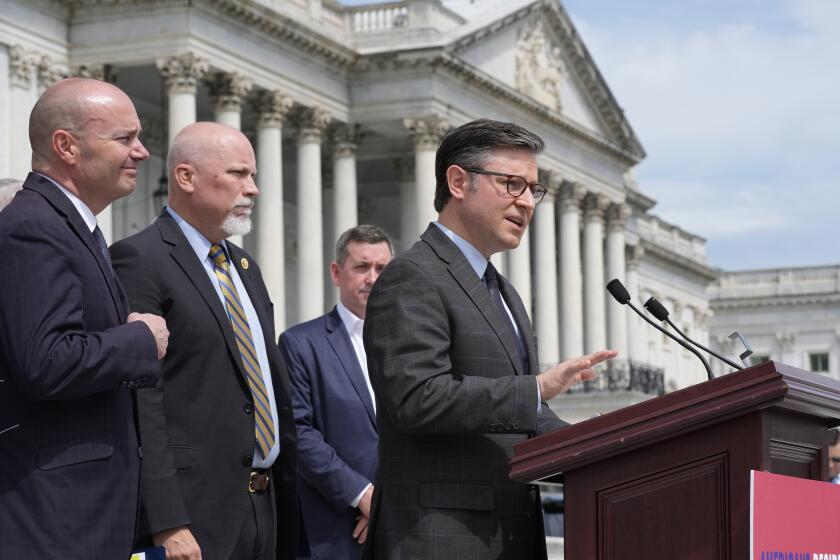Judicial Candidates Argue Over Experience, Values
With less than two weeks remaining in the campaign, the opponents for a vacant seat on the Ventura County Superior Court bench sparred Wednesday over the experience and fundamental values each would bring to the job.
In a forum sponsored by Women Lawyers of Ventura County, Kevin McGee and Gary Windom grappled with the questions that have been at the core of the campaign for months: Is the Ventura County bench overloaded with ex-prosecutors? And will the voters in an affluent, law-and-order county be more swayed by an attorney for indigent defendants than by one whose mission is to put criminals away?
McGee, the second-in-command at the district attorney’s office, cast himself as a conservative who places a greater value than Windom on public safety. Windom, a top public defender, hammered home his broad legal background and day-to-day courtroom experience, saying McGee has been an administrator rather than a front-line lawyer for the past 10 years.
The two engaged in a number of prickly exchanges, including one on tough sentencing.
“We couldn’t be more polar opposites,” said McGee, who has been endorsed by the county’s law enforcement leaders. “I’m not afraid to say I support the death penalty and the three-strikes law.”
Windom said he would enforce laws governing the death penalty and three-strikes sentencing. But he criticized McGee’s public endorsement of those measures, saying it violated judicial ethics and would open him to charges of bias if he were elected and those laws should change.
McGee countered that judicial candidates are allowed to state their beliefs about specific laws, as long as they do not commit to specific actions on the bench. He also questioned whether Windom would mete out the rigorous sentences he said the public wants.
“I don’t hear him saying he supports the death penalty--just that there’s a death-penalty law and he’d enforce it,” McGee said.
Asserting the function of prosecutors is to hold criminals accountable, McGee suggested voters would not trust a judge who had spent much of his career as a defense attorney.
Windom was a civil attorney for 11 years before joining the public defender’s office in 1986.
While public defenders do “a valuable and critical job,” their mission is to “help people avoid responsibility for criminal conduct,” McGee said. “If that means someone who is guilty walks out of the courthouse, so be it.”
In an impassioned response, Windom called McGee’s argument “ludicrous.”
“When you protect the rights of the individual, you protect the rights of the whole,” he said, quoting a federal judge.
A 16-year employee of the district attorney’s office, McGee supervises about 90 attorneys and 400 other employees. Throughout the campaign, Windom has contended the courts are needlessly dominated by ex-prosecutors, with 19 of 26 judges alumni of the district attorney’s office.
Responding to a question, McGee said his decisions as judge would not be influenced by his ties to Dist. Atty. Michael Bradbury and his staff.
“Absolutely not,” he said. “We’re a completely different branch of government. That’s the way it is.”
Besides, he said, it probably would be years before he would hear a criminal case. The next Superior Court judge will probably be assigned to family law cases before being rotated to either civil or criminal matters, both candidates said.
Windom took several opportunities to suggest McGee would be ineffective because he has not tried a case in 10 years.
“If you needed a triple-bypass, you wouldn’t want it performed by a doctor who had only been ‘exposed’ to it for 10 years,” he said.
McGee retorted that you wouldn’t want a triple-bypass performed by a podiatrist either.
He said that as an administrator he has supervised every major case making its way through the district attorney’s office.
“We don’t need a third trial attorney in court,” he said. “We need someone to manage the case.”
The candidates did agree on a number of points.
Both said the juvenile justice system is in need of an overhaul, and that confidentiality restrictions should be reconsidered.
Windom suggested a “family court” that brings matters involving children under one roof.
Currently, a criminal judge might order a father accused of molestation to stay away from his children at the very time a family law judge is trying to bring the family back together. Confidentiality rules prevent the judges from communicating, he said.
More to Read
Start your day right
Sign up for Essential California for news, features and recommendations from the L.A. Times and beyond in your inbox six days a week.
You may occasionally receive promotional content from the Los Angeles Times.







